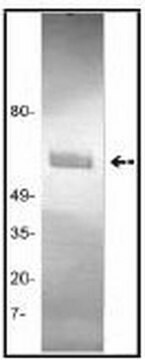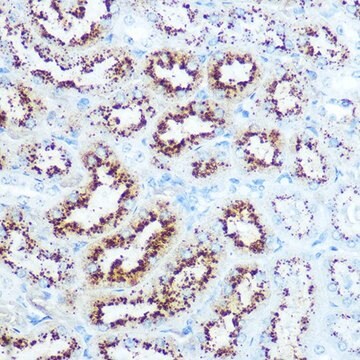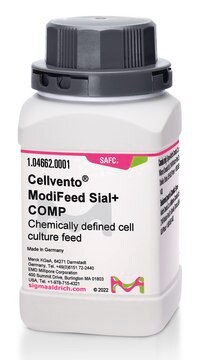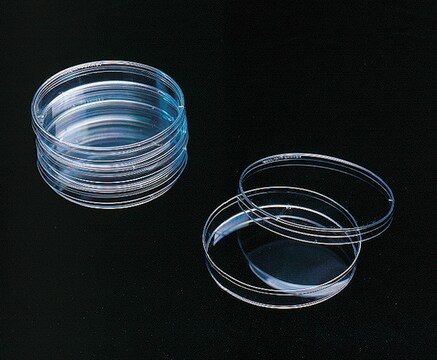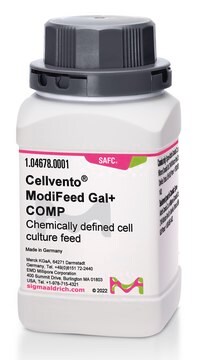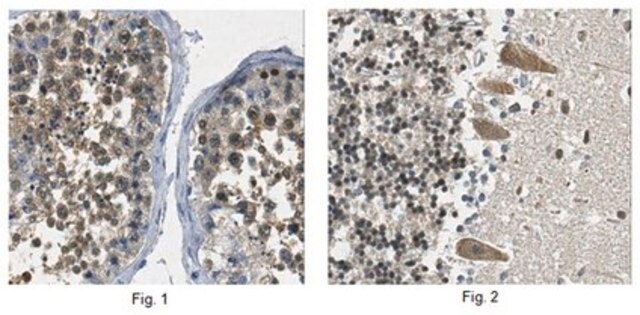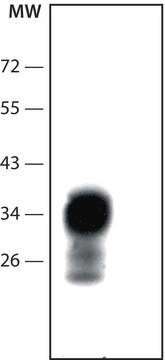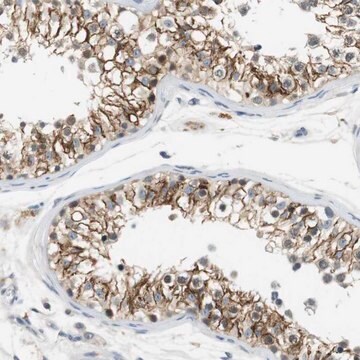14-338
ROKα/ROCK-II Protein, active, rat, 10 µg
Active, rat, N-terminal, His-tagged, fusion protein corresponding to amino acids 2-543 of rat ROKa/ROCK-II. For use in Kinase Assays.
Sign Into View Organizational & Contract Pricing
All Photos(1)
About This Item
UNSPSC Code:
12352202
eCl@ss:
32160405
NACRES:
NA.32
Recommended Products
biological source
rat
Quality Level
mol wt
Mw 66 kDa
manufacturer/tradename
Upstate®
technique(s)
activity assay: suitable (kinase)
NCBI accession no.
UniProt accession no.
shipped in
dry ice
Gene Information
rat ... ROCK1(81762)
General description
N-terminal, His-tagged, fusion protein corresponding to amino acids 2-543 of rat ROKa/ROCK-II.
Note: The preparation contains numerous Sf21 cellular proteins which bind weakly to Ni-NTA agarose.
Note: The preparation contains numerous Sf21 cellular proteins which bind weakly to Ni-NTA agarose.
Product Source: Rat ROKa/ROCK-II expressed in Sf21 insect cells.
Biochem/physiol Actions
Protein Target: ROKα/ROCK-II
Target Sub-Family: AGC
Quality
Rroutinely evaluated using the S6 Kinase Assay Kit
Physical form
10μg of enzyme in 2.3μl of 50mM Tris/HCl pH7.5, 150mM NaCl, 0.1mM EGTA, 0.03% Brij-35, 270mM sucrose, 2mM benzamidine, 0.4mM PMSF, 0.1% 2-mercaptoethanol. Frozen solution.
Ni-NTA agarose
Storage and Stability
6 months at -70°C
Other Notes
For Specific Activity data, refer to the Certificate of Analysis for individual lots of this enzyme.
Legal Information
UPSTATE is a registered trademark of Merck KGaA, Darmstadt, Germany
Disclaimer
Unless otherwise stated in our catalog or other company documentation accompanying the product(s), our products are intended for research use only and are not to be used for any other purpose, which includes but is not limited to, unauthorized commercial uses, in vitro diagnostic uses, ex vivo or in vivo therapeutic uses or any type of consumption or application to humans or animals.
Signal Word
Warning
Hazard Statements
Precautionary Statements
Hazard Classifications
Skin Sens. 1
Storage Class Code
12 - Non Combustible Liquids
WGK
WGK 2
Flash Point(F)
Not applicable
Flash Point(C)
Not applicable
Certificates of Analysis (COA)
Search for Certificates of Analysis (COA) by entering the products Lot/Batch Number. Lot and Batch Numbers can be found on a product’s label following the words ‘Lot’ or ‘Batch’.
Already Own This Product?
Find documentation for the products that you have recently purchased in the Document Library.
J Feng et al.
The Journal of biological chemistry, 274(6), 3744-3752 (1999-01-28)
Rho-associated kinase (Rho-kinase) from chicken gizzard smooth muscle was purified to apparent homogeneity (160 kDa on SDS-polyacrylamide gel electrophoresis) and identified as the ROKalpha isoform. Several substrates were phosphorylated. Rates with myosin phosphatase target subunit 1 (MYPT1), myosin, and the
David A Carlson et al.
Cell chemical biology, 25(10), 1195-1207 (2018-07-24)
Sustained vascular smooth muscle hypercontractility promotes hypertension and cardiovascular disease. The etiology of hypercontractility is not completely understood. New therapeutic targets remain vitally important for drug discovery. Here we report that Pim kinases, in combination with DAPK3, regulate contractility and
M Eto et al.
The Journal of biological chemistry, 276(31), 29072-29078 (2001-06-09)
Histamine stimulus triggers inhibition of myosin phosphatase-enhanced phosphorylation of myosin and contraction of vascular smooth muscle. In response to histamine stimulation of intact femoral artery, a smooth muscle-specific protein called CPI-17 (for protein kinase C-potentiated inhibitory protein for heterotrimeric myosin
Vincent Sauzeau et al.
Methods in molecular biology (Clifton, N.J.), 1527, 213-218 (2017-01-25)
Increased arterial tone and the resulting rise in peripheral vascular resistance are major determinants of the elevated arterial pressure in hypertension. The RhoA/Rho kinase signaling pathways are now recognized as a major regulator of vascular smooth muscle contraction and arterial
E Sahai et al.
Current biology : CB, 9(3), 136-145 (1999-02-18)
The Ras-related GTPase RhoA controls signalling processes required for cytoskeletal reorganisation, transcriptional regulation, and transformation. The ability of RhoA mutants to transform cells correlates not with transcription but with their ability to bind ROCK-I, an effector kinase involved in cytoskeletal
Our team of scientists has experience in all areas of research including Life Science, Material Science, Chemical Synthesis, Chromatography, Analytical and many others.
Contact Technical Service